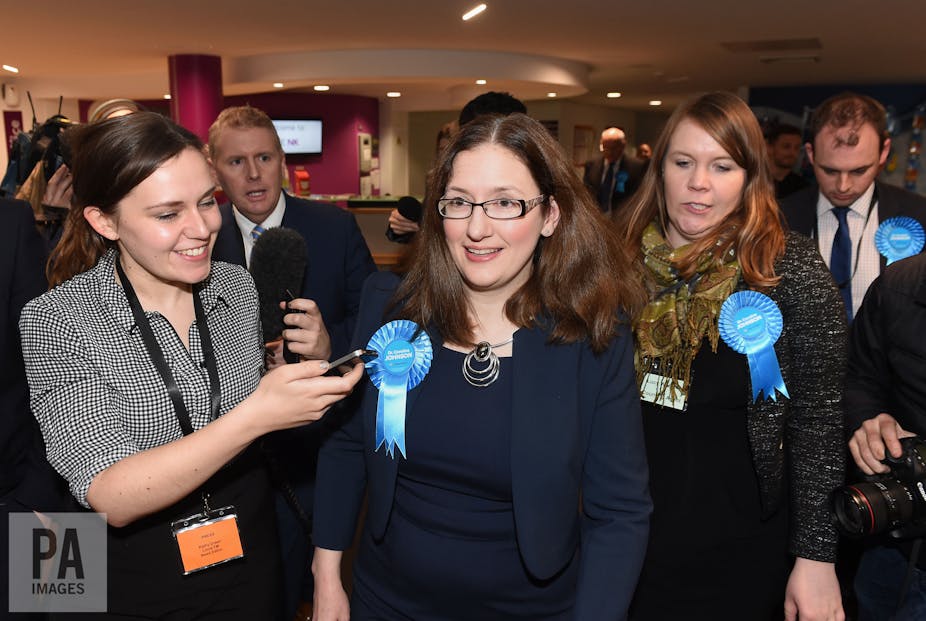For the Conservative Party, the by-election victory in Sleaford and North Hykeham on December 8 will have come as something of a relief after the surprise Liberal Democrat win in the Richmond by-election a week earlier.
Caroline Johnson won the by-election with a 53.5% share of the vote, only 2.7% lower than at the 2015 general election, a very credible performance given that turnout, at 37.1%, was barely half that of 2015. The new MP for Sleaford and North Hykeham immediately pledged her loyalty to the prime minister. The by-election had been triggered when Conservative MP Stephen Phillips resigned criticising Theresa May’s handling of the Brexit process.
There was no repeat of the anti-Brexit sentiment in the Richmond by-election, but there was never likely to be one: in the North Kesteven district, which includes Sleaford, 62% voted to leave the European Union in June 2016.
Given that the day before polling, MPs in parliament backed the May government’s timetable for triggering Article 50 to begin negotiations for exiting the European Union by a majority of 461 to 89, there was little reason for discontent among Conservative Brexiteers to desert their party for UKIP.
May will be relieved that her wafer-thin parliamentary majority at Westminster has increased to 11 MPs. That will not alter the fact that her government’s room for manoeuvre, both in Article 50 negotiations and in relation to major domestic policy issues, will remain heavily constrained until May 2020 by a parliamentary party for which rebellion has now become commonplace, if not yet a contagion.
UKIP lag far behind
For the other political parties, there is little but cold comfort. UKIP’s novice leader Paul Nuttall described his party’s second place finish as one “small step on a long road”, but their candidate Victoria Ayling’s 13.48% share of the vote left UKIP more than 40% behind the Conservatives. In a first-past-the-post electoral system, such Pyrrhic victories are of little long-term political consequence.
Shorn of its political appeal by the May government’s commitment to Brexit and tough stance on immigration, UKIP has lost its principal weapons for recruiting disaffected MPs and voters.
Before the May 2017 mayoral elections in some of England’s major northern cities, Nuttall must decide whether there is any further mileage in playing UKIP’s traditional British nationalist card, or whether under his leadership it should seek to become an authentic English nationalist party.
Labour fail to capitalise
For the Labour Party, the by-elections in Richmond and Sleaford and North Hykeham were always going to be difficult campaigning territory. Nevertheless, Labour should have polled more votes.
Days before the vote, details were leaked of the controversial Lincolnshire Sustainability and Transformation Plans to centralise and close certain NHS specialist services treasured by local communities, including downgrading of the Accident and Emergency Department at Grantham hospital near Sleaford to an Urgent Care Centre. Labour failed to capitalise on this growing crisis for the NHS in England.
In Sleaford and Hykeham, their candidate Jim Clarke may have saved his deposit by a comfortable margin, but at 10.24%, Labour’s share of the vote had declined by 7.02% since the 2015 general election.
Standing for the Lincolnshire Independents, a political party formed only in 2008 and with a localist, county-based agenda, Marianne Overton came within 472 votes of pushing Labour into fifth place.
This woeful electoral performance will only serve to reinforce the widespread scepticism about the capacity of Labour under leader Jeremy Corbyn and shadow chancellor John McDonnell to mount an effective opposition at Westminster and beyond.
Woes to come
Not since the Great Depression of the 1930s have the working people of England so desperately needed a credible alternative to the failed politics of austerity which, according to the forecasts in the 2016 Autumn Statement, will have added almost a trillion pounds to the national debt by May 2020.
In early December, the Joseph Rowntree Foundation reported that 13.5m, or 21% of the UK population were living in poverty in 2014-15, and that 3.8m of them were workers.
Hard-working families face the prospect of a return to the stagflation of the mid-1970s: rising prices coinciding with stagnant or falling real incomes. Mark Carney, the governor of the Bank of England, warned of “the first lost decade since the 1860s”, because the current level of UK economic activity remains fully 16% below its pre-financial crisis trend.
Initially under Ed Miliband’s leadership, and now under Corbyn, there is also a danger that the 2010s will become known politically and electorally as the lost decade for the Labour Party. Yet, now that she has confirmation of parliamentary support for her timetable, if May fails to secure a successful Brexit settlement for the UK, the decade may be lost for more than just the Labour Party.

